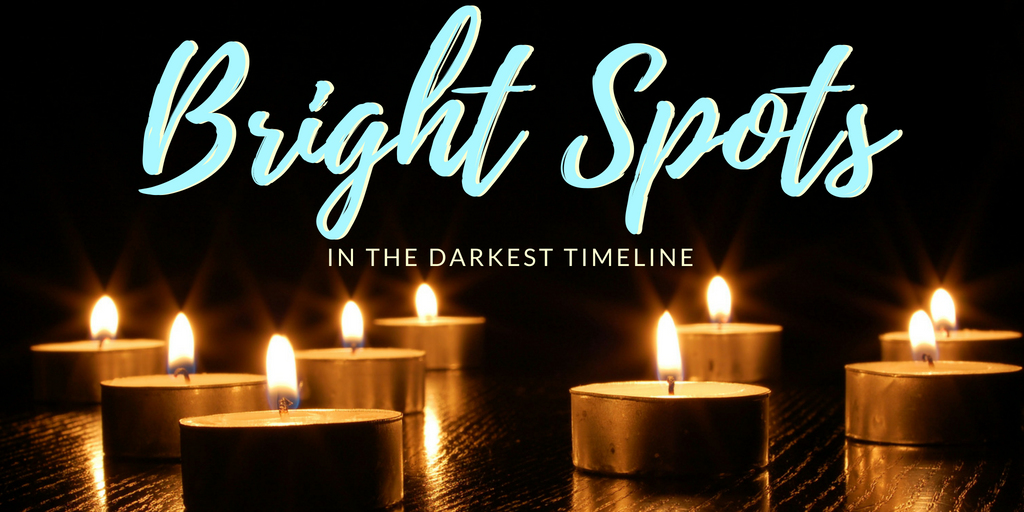When Brian Hades and I were discussing themes for Nevertheless (Tesseracts Twenty-one) one of the possibilities he suggested was optimistic speculative fiction. I pounced on that idea for two reasons. First, because I’d just recently become aware of solarpunk (largely through Sarena Ulibarri) and was excited to work on an anthology that might include some and second because I’d become convinced that we were living in the darkest timeline.
That was in 2016. I had no idea how much darker it could become.
Still, despite a very difficult couple of years, I manage to find reasons for optimism. Lights in the darkness. And I’m not alone in that.
In the coming weeks I will be hosting a series of blog posts I’m calling “Bright Spots in the Darkest Timeline”. Each will be written by a Nevertheless (Tesseracts Twenty-one) contributor and I think they will serve the dual purpose of giving me an excuse to talk about the anthology, and shining a bit of light into people’s lives.
Today’s contribution comes from Michael Milne who is talking about humanity and optimism.
Smiling Happy Killer Robot Land: Optimism Through Imaginary Futures, Even The Bad Ones
by Michael Milne
It feels easy to write dystopian fiction. Looking around at how the world as it is today, it’s not hard to extrapolate to an imagined future where things look bleak. Take current climate trends and blow them out a few decades or centuries and you’ve got a dieselpunk wasteland. Think about rising tides of fascism and you’ve got yourself a YA fantasy government percolating in your brain. Consider how much of your data has been stored, copied, aggregated, and used against you and suddenly you can imagine a digital you gestating in a Silicon Valley tech lab.
But when I really think about speculative fiction, even those most dire and sad and gruelling adventures through whatever we’ve done to ourselves and the planet, there’s always the kernels of optimism. Even when a story is unrelentingly dark or pessimistic, there’s still usually somebody, somewhere in there, trying to do good.
Even beyond the big, rebellious adventures against the autocratic robot governments, there’s the tiny human stories. Under heavy oppression or acid rains or terrible laserwar, there’s characters being people. They might be the protagonist, or they might be someone in the background, but I always notice these people in the future. People having kids, and hoping those children will have a better life than the parents led. People falling in love, despite whatever in the world is trying to keep them apart. People working at their jobs, but dreaming of something more.
Even outside of optimistic stories like those in Nevertheless, it’s these human qualities in otherwise dark stories that can give me a sense of hope. They remind me that even over human history, where we’ve done pretty terrible things to each other, there were always still people striving to make things better. Bravery, compassion, empathy, and love have lived through some of the darkest eras of humanity, and no matter how dire we write our futures, those qualities seem to live out.
The seeds of humanity in these situations are still being planted and growing, even if the soil is irradiated by nuclear space monsters, or if we don’t even have soil anymore. If those characters can imagine a better future for themselves, if they can be faced with all the weight and horrors that their writers through at them and still hope, then I think I can too.
Michael Milne is an author and teacher originally from Canada. He writes and annoys barristas worldwide, but mainly in coffee shops in Korea, China, and Switzerland. His website is www.michaelmilne.ca and you can find him on Twitter @ironcardigan.



For many years I taught the sociology of education courses on my campus, which tends to be a bit depressing for students. Reading about the impact of social class, gender, ethnicity and so on students life chances, many student teachers became disillusioned with their chosen profession, some even dropping the program…. So I had to re-orient the course to emphasize Henry Giroux’s theory of resistance: that oppressive as the system is, it is so large and cumbersome that it is quite possible to carve out a niche for oneself where one can make a real difference, that difficult is not the same as hopeless, and that optimism is a better stance than defeatism…. So yeah, life can be lived fully even in the cracks, killer robots notwithstanding.